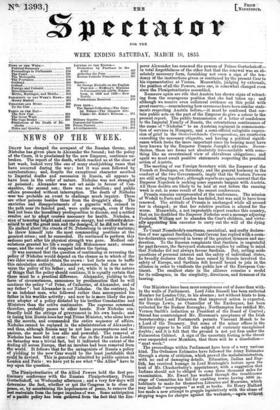NEWS OF THE WEEK.
DEATH has changed the occupant of the Russian throne, and Nicholas has given place to Alexander the Second; but the policy of the Czars, it is proclaimed by the new Emperor, continues un- broken. The report of the death, which reached us at the close of last week, looked very like one of many stoekjobbing ruses that have occurred during the war ; but it was soon followed by corroborations; and, despite the exceptional character ascribed to Imperial deaths and succession in Russia, all appears to have been in the order of nature. Nicholas was not strangled or poisoned ; Alexander was not set aside in favour of Con- stantine, the second son; there was no rebellion; and public affairs proceeded without interruption. The death of Nicholas was too probable an event to challenge much inquiry. There are other poisons besides those from the druggist's shop. The anxieties and disappointments of a gigantic will, crossed in the path near its fancied goal, were quite enought even if there inid not been the hereditary predisposition to disease, and a settled resolve not to adopt courses necessary for health. Nicholas, a man of towering height and excessive energy, had evidently deter- mined to act the great man and the demigod, if he did not feel so. He stalked about the streets of St: Petersburg in cavalry costume; he threw himself into the most commanding positions at the greatest prises ; and he succeeded. He continued to perform this WILLOW part after his physical strength was gone. -Medical cal- culations granted his life a respite till Midsummer next; crosses cause, and the cord of life mapped before the Spring. It was assumed that the question of continuing or reversing the policy of Nicholas would depend on the chance as to which of the two elder sons should obtain the crown : but facts seem to baffle this calculation entirely. Alexander succeeds, but does not re- verse the policy of his father ; and yet, while it is in the nature of things that the policy should continue, it is equally certain that there must be a practical difference. Alexander, yielding to the Wee of circumstances, announces by proclamation' that he will continue the policy " of Peter, of Catherine, of Alexander, and of my father ": but Alexander is not Nicholas. On the contrary, he it an indolent man, who followed rather than accompanied his father in his warlike activity ; and now he is more likely the pas- sive adopter of a policy dictated by his brother Constantine and Ministers than the active continuator. The supreme command, therefore, probably passes to other hands. Now Nicholas con- fessedly held the strings of government in his own hands; • and in losing him Russia loses her real Prime Minister, who alone knew all the secrets, and commanded the entire sequence of affairs. Nicholas cannot be replaced in the administration of Alexander ; and thus, although Russia may be not less presumptuous and ra- pacious, she must be less able and powerful. The removal of Nicholas has been felt at once : the rise in the Funds in London on Saturday was a trivial fact, but it indicated the extent of the feeling all across Europe, that an incubus had been removed from the world. It follows that for the antagonists of Russia a policy of yielding to the new Czar would be the least justifiable that Odd be devised. This is generally admitted by public opinion in 1,•ondon and Paris : we have yet to see what " the Allies" have to say upon the question.


























